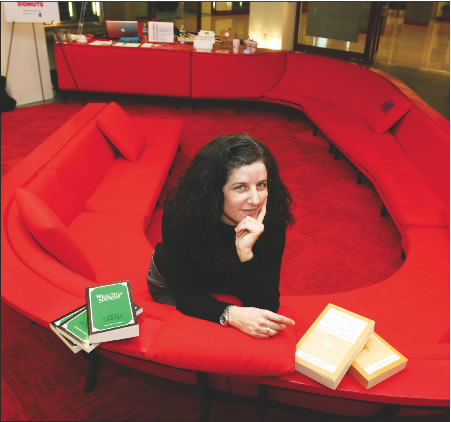New Yorkers already fixated on the economic crisis have a new place to air their thoughts: The artist Linda Pollack opened a space in One New York Plaza this week to spur economy-themed conversation.
“Everyone has experience with the economy, whether they’re formally involved with Wall St. or not,” Pollack said. “It’s a challenging time, but it’s also a time for art and reflection.”
In the tradition of 19th-century salons, Pollack’s Habeas Lounge offers a comfortable place to hold intellectual discussions. A long, bright red couch snakes around the room, which will soon house an economic history exhibit in what used to be a floral shop’s refrigerator case. The exhibit will include a letter Alexander Hamilton wrote during the financial crisis of 1792.
“We’re searching for our Alexander Hamilton of today,” Pollack said.
Brookfield Properties, which owns One New York Plaza, donated the vacant store space for the Habeus Lounge. Brookfield does many other free community arts events at the World Financial Center on the other side of Lower Manhattan.
“It would be nice to have every square inch [of retail space] generating revenue,” Brookfield spokesperson Bruce Cohen said, but Brookfield is glad to “put the space to good use in the meantime.”
The Habeus Lounge is open weekdays from noon to 4 p.m. through May 1, and most of the time it will host informal discussions, likely between local workers who are on their lunch breaks. Pollack is also bringing in speakers, included economics professor Robert E. Wright, who will speak on “The Trouble with Bubbles” next Tuesday at 12:30 p.m. The space will also host a “Wealth of Nations” book club alternate Wednesdays at 5:30 p.m. starting March 4.
Many people walking past the Habeus Lounge glanced in curiously on Tuesday, the first day it was open, but no one sat down to talk. Pollack predicted it would take about a week for word to spread.
“That’s a great idea,” said Ivan Caban, 24, a building security officer, when told of the lounge’s purpose. “What better time to talk about the economy than now?”
Caban said he would try to stop by the lounge once discussions began. Several other workers hurrying past said they were interested but often ate at their desks and weren’t sure they could take the time to sit and talk.
Pollack did another Habeus Lounge last summer in a Brookfield-owned building in Los Angeles, focusing on urban planning. When she moved the exhibit to New York’s Financial District, the economy seemed an obvious topic choice, she said.
Pollack described the exhibit as evolving in response to the interests of the people who visit it. Asked if the space would have any rules at all, Pollack thought for a moment, then said, “Just no food fights.”
— Julie Shapiro


































